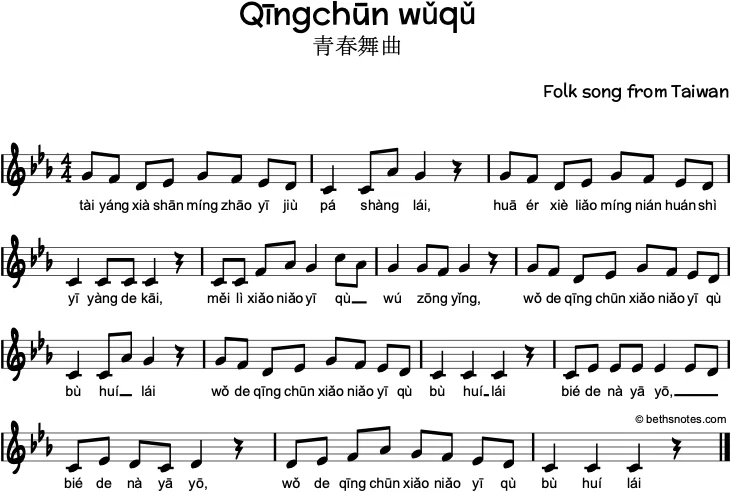
Lyrics - Pinyin
(Japanese folk song)
tài yáng xià shān míng zhāo yī jiù pá shàng lái
huā ér xiè liǎo míng nián huán shì yī yàng de kāi
měi lì xiǎo niǎo yī qù wú zōng yǐng
wǒ de qīng chūn xiǎo niǎo yī qù bù huí lái
wǒ de qīng chūn xiǎo niǎo yī qù bù huí lái
bié de nà yā yō, bié de nà yā yō
wǒ de qīng chūn xiǎo niǎo yī qù bù huí lái
English Translation - Youth Dance
The sun goes down and will still come up tomorrow morning
The flowers have withered but they will still bloom next year
The beautiful island disappeared without a trace
The little bird of my youth will never come back
The little bird of my youth will never come back
Others are like that, others are like that.
The little bird of my youth will never come back
Chinese - 青春舞曲
太陽下山明朝依舊爬上來
花兒謝了明年還是一樣的開
我的青春一去無影蹤
我的青春小鳥一去不回來
我的青春小鳥一去不回來
別的那樣喲 別的那樣喲
我的青春小鳥一去不回來
See also
- Country: Taiwan
- Subjects: sun / flowers / birds
- Harmony: chords i & v
- Meter: 4
- Scale: natural minor
- Source: Share the Music, Grade 6, Macmillan / McGraw-Hill School Publishing Company, 1995
YouTube
- Downloadable song (PDF)
- MIDI file
- Listen to the song

2 thoughts on “Qīngchūn wǔqǔ”
Hi there!
This is actually a traditional Xin Jiang Uyghurs minority song made in 1941.
Here’s the translation:
In 1939, Wang Luobin, while compiling materials, discovered a Uyghur folk song. In the spring of 1941, as an active member of the Eighth Route Army’s Northwest Battlefield Service Corps promoting resistance against Japanese invasion and national salvation, Wang Luobin was arrested by secret agents of the Military Intelligence Bureau in the Eighth War Zone of Lanzhou and imprisoned in Shagou Prison, north of Lanzhou. While confined in a 1.5-meter-square wooden cage, he rolled up toothpaste tubes to make a pen and adapted the Uyghur folk song into a Chinese tune titled Youth Dance Song to commemorate his lost youth, freedom, and love.
Hi there!
I agree! It is a song from the Xinjiang Uyghur minority.